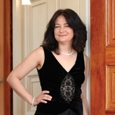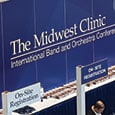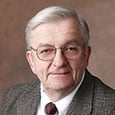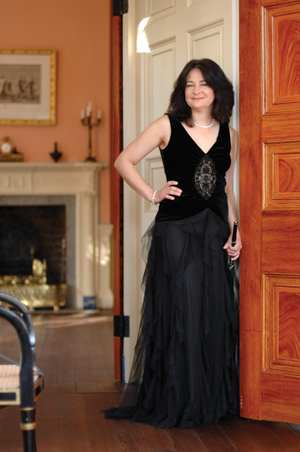 While Regina Helcher Yost primarily performs with the Charleston Symphony, she is constantly on the go playing flute and piccolo in other orchestras throughout the US. She is an active chamber musician, teaches students at Charleston Southern University and commissions many works for piccolo. She encourages flutists to develop their piccolo talents as it increases their performing opportunities in today’s difficult job market.
While Regina Helcher Yost primarily performs with the Charleston Symphony, she is constantly on the go playing flute and piccolo in other orchestras throughout the US. She is an active chamber musician, teaches students at Charleston Southern University and commissions many works for piccolo. She encourages flutists to develop their piccolo talents as it increases their performing opportunities in today’s difficult job market.
How did you get started on piccolo?
I began playing the flute when I was 10 years old. At 15, I decided I wanted a piccolo. My father took me to a local music store and bought me one. I could not make a single sound with it no matter how much I tried, but I thought I just was not used to playing it. The next week I auditioned for the Cincinnati Youth Symphony Orchestra. After the audition, the conductor asked if I played the piccolo. Even though I still had not been able to get a sound out of the piccolo, I enthusiastically replied, “Why yes I do, and I even own one.” A few days later I received a letter in the mail stating I had won a position in the Cincinnati Youth Symphony Orchestra. When I arrived for the first rehearsal, I looked at the seating chart and realized I was the piccolo player, and we were playing the Candide Overture by Leonard Bernstein.
I knew I was in serious trouble. After the rehearsal I called Jack Wellbaum, piccolo of the Cincinnati Symphony Orchestra, and told him what a pickle I was in. Wellbaum invited me to his flute studio, took one look at my piccolo, and said it was a terrible instrument. He handed me a used professional piccolo that he had just refurbished and told me I needed to buy it.
This was the start of Wellbaum becoming my lifelong mentor. I took piccolo lessons with him while studying flute with Rebecca Tryon Andres. At one lesson, he handed me Learning the Piccolo: A Treatise on the Subtleties and Problems of Playing the Piccolo in Relation to the Flute (1996) by Clement Barone. He said if I could play the entire book perfectly for him the next week, he would give me the book for free. He also assigned the Vivaldi C Major Piccolo Concerto. The next week my lesson started with the Vivaldi, and we never touched the book. When I asked him about playing it, he said, “I know you practiced it and can play it. It is yours.” I went on to win several concerto competitions and piccolo auditions and soon realized that this is what I wanted to do with my life.
What was Wellbaum like as a teacher?
Jack Wellbaum was an incredibly warm and encouraging teacher. He was like a grandfather to me. He was demanding and if he did not think I sounded my best, he would say so. I loved that about him because I believe it is important to be honest with your students.
Wellbaum held a non-credit two-hour piccolo masterclass once a week. Even though there was no college credit, all the Cincinnati College Conservatory of Music flutists attended. We played excerpts for each other including those for two piccolos. He talked about what it was like to perform the excerpts in an orchestra based on his years of experience. He was a great wealth of knowledge for us.
Years later after I had been a professional musician for a while, Wellbaum called me out of the blue and told me how proud he was of me. His comments meant so much to me. I decided if I ever felt that way about a student, I would tell him too. Music is a difficult business, and sharing an honest heart-felt compliment is important.
What are your thoughts on auditioning?
Winning an audition is hard. Basically it comes down to three things: owning the best instrument possible, total preparation, and luck. When buying a piccolo, ask a professional player to help you. Play excerpts and long tones using a variety of dynamics and most importantly, check the intonation of the instrument with a tuner.
To be prepared start your preparation early. Practice with a tuner and a metronome. Play mock auditions for friends. If the same comments are said over and over by different musicians, fix the problem. Try to study the excerpts with the leading orchestral players. Read books on how to mentally prepare for competitions such as Audition Success by Don Greene and The Inner Game of Music by Barry Green. Books on sports psychology such as The Mental Athlete by Kay Porter can be beneficial too. The focus should be on how well you can play, not on winning a prize. Get a lot of rest before an audition and eat healthy foods. Bring a water bottle and some snacks. The rest is up to luck.
Why should flutists become proficient in playing the piccolo?
For years now, I have heard some professional flutists say they do not play the piccolo, they only play the flute. They may not like the piccolo or think they do not sound good playing it. Whatever the reason, unless they have landed a good job as a principal flutist in an orchestra somewhere, I believe this is putting them at a disadvantage. I strongly encourage all of my students to learn the piccolo. All of the orchestral auditions except principal flute require some piccolo playing on their auditions (assistant principal flute, second flute, and piccolo). The audition committee does not care if you do not like to play the piccolo. They are listening for the best playing possible on both instruments.
When orchestras need a substitute flutist, they do not just want someone who plays the flute well, they also want someone who plays piccolo well. As an example, there are many second flute parts in which the flutist switches to piccolo. If an orchestra wants to save money, they are not going to hire two players to perform this part; they will simply hire a flutist who plays both instruments. Becoming a good piccolo player increases your chances of getting hired.
What is your rehearsal schedule like each week, and how do you balance this with your university teaching?
Being a musician, no matter what you do in music, requires some pretty amazing organizational skills. Musicians lead incredibly busy lives. So, my orchestral schedule is like a checkerboard. Services (which are rehearsals or concerts) can happen every day except Monday. Every week has a different schedule depending on what type of concerts we are performing (Masterworks, Pops, Chamber Orchestra, new music, kiddy shows). Monday is our designated day off, so I teach all of my college students on Monday along with coaching the CSU Flute Choir on Monday nights. Other per-service orchestras I play with, such as the Hilton Head Symphony Orchestra and Greenville Symphony Orchestra, send out availability sheets before each season starts. You fill them out with your availability based on your schedule. Chamber Music Charleston, a successful professional chamber music group of which I am a member, tries to schedule each musician around all of their other musical obligations. It becomes quite an intricate juggling act, but you get used to it.
Do you encourage students to double degree?
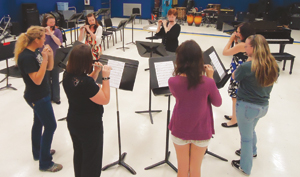 A student once asked Leonard Bernstein, “Should I go into music?” Bernstein replied, “If you have to ask the question then the answer is no. If you really want to go into music you will and nothing will stop you.” I agree with Bernstein. Music is an incredible passion, but it is not easy. I did not win every job I wanted, and there were times of disappointment and hardship. However, I love music. If you want it badly enough, then you will find a way. This said, I do encourage my performance majors to select the double degree option. It is difficult to get any job, even non-music jobs, and I think students should make themselves as employable as possible. At Charleston Southern University, I teach flutists who major in performance, music education and music therapy as well as in history, nursing, elementary education, and criminal justice among many others.
A student once asked Leonard Bernstein, “Should I go into music?” Bernstein replied, “If you have to ask the question then the answer is no. If you really want to go into music you will and nothing will stop you.” I agree with Bernstein. Music is an incredible passion, but it is not easy. I did not win every job I wanted, and there were times of disappointment and hardship. However, I love music. If you want it badly enough, then you will find a way. This said, I do encourage my performance majors to select the double degree option. It is difficult to get any job, even non-music jobs, and I think students should make themselves as employable as possible. At Charleston Southern University, I teach flutists who major in performance, music education and music therapy as well as in history, nursing, elementary education, and criminal justice among many others.
Why do you require your CSU students to play the piccolo solo from Sousa’s Stars and Stripes Forever at their juries?
Whether you are a music performance major or not, I feel it is important for flutists to know this solo, in both the orchestral and band keys. This solo is so famous that I would find it embarrassing if my students could not play it. Most importantly, however, if any of my students are hired to play extra with an orchestra or band, chances are it will be for an outdoor pops concert, and the concert most likely will include this piece. I want them to be prepared.
My advice in preparing this piece is to memorize the solo in both the orchestral and band keys. Play all of the grace notes on the beat, not before the beat. I suggest that students go to YouTube and listen to how Sousa’s band played it while watching the part. Many of the trills are not exactly the same as they are played now, and it may also be printed differently. Of course, when subbing in an orchestra, play it exactly as the other flutists in the section are performing it.
How do you decide which of your many piccolos to play?
I currently own four piccolos and seven piccolo headjoints. One of my piccolos, although made by a professional piccolo maker, is a less expensive model, so I play that one for outdoor Charleston Symphony concerts. All of my piccolos and headjoints are made of grenadilla wood. I am not a person that plays different piccolos or headjoints in the same concert. I generally just play one piccolo and one headjoint per concert. I decide which one by whom I am playing with in the section. If I am playing with a flute section that generally plays at a lower pitch (keeps the pitch close to A=440) then I play a certain instrument and headjoint that is easier to play at that pitch level and creates a darker tone color. If I am playing in a flute section that plays on brighter more modern instruments, then I play another piccolo and headjoint that I feel matches them better. It is all about blending with and matching the flutists in the section.
What are your thoughts on playing piccolo in orchestra?
I love playing piccolo in the orchestra. Not only does the piccolo generally have very cool solos (Shostakovich Symphonies or Tchaikovsky Symphony #4), but the piccolo plays the extremely high notes on top of the orchestral tutti lines so everyone can hear you. It is a glorious feeling. Piccolo playing is not for the faint of heart. When playing the piccolo in an orchestra, there is no place to hide.
How do you prepare for performing the challenges of Tchaikovsky Symphony #4?
I practice it at various times of the day and in many different ways. I practice it slow, I practice it with the tuner, I practice it without the fast slurred notes, I practice it using just the first two slurred notes, I practice the entire solo as written and in tempo, and I record myself. After all of that, several times a day I will practice it by placing the headjoint on my face and playing it, then taking the headjoint away and repeating the process. I find this to be very helpful. This way I am replicating what it feels like to play it without keeping the instrument there, because that is what it will feel like in performance.
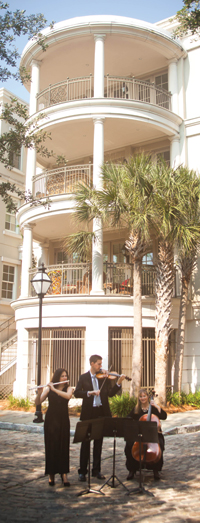 Do you have any other piccolo mentors besides Jack Wellbaum?
Do you have any other piccolo mentors besides Jack Wellbaum?
Other mentors include Walfrid Kujala, Lois Schaefer and Carl Hall. Besides private lessons with Kujala, I also studied with him in his summer masterclasses at Northwestern University. Kujala is one of the nicest and most knowledgeable people I have ever met. He knows every alternate fingering possible on the piccolo, and even now, I sometimes email him for advice.
As a child, I used to watch the Boston Pops conducted by Arthur Fiedler on television. They showed lots of close ups of Lois Schaefer playing the piccolo. One of my dreams in life was to perform at the Tanglewood Festival, perform with Leonard Bernstein and Seiji Ozawa conducting, and take piccolo lessons with Lois Schaefer. Eventually that dream came true. One of the most valuable statements Schaefer made to me was, “You will learn most of how to be a great orchestral piccolo player on the job.” She was right. Learning to blend with colleagues and play with accurate pitch is pretty much learned on the job.
When I was working in Hawaii, I bought the famous recording of the Atlanta Symphony performing all the Rossini Overtures with Yoel Levi conducting. I thought it was the most amazing piccolo playing I had heard in my entire life. When I moved back to the mainland to play in the Knoxville Symphony, I knew I had to meet this piccolo player, even though I did not know his name. I wrote a letter addressed to Piccolo Player, Atlanta Symphony, asking for a lesson. I explained how I adored his playing in the Rossini Overture recording. Later I received a phone message on my answering machine from Carl Hall saying that I could indeed have a piccolo lesson. I adored Hall’s teaching. He has a wonderful ear for details, pitch and musicality. A few years ago Hall sold the piccolo he recorded the Rossini Overtures on to me. I have named that piccolo the “Rossini.”
What were lessons like with James Pellerite at Indiana University?
I studied with James Pellerite the very last year he taught at Indiana University. It was a wonderful experience. Pellerite was very encouraging, always telling me of the latest competitions he wanted me to enter. He also wanted to coach me on every big solo I was to play in the orchestra. Often he would come to hear our orchestral performances. He was very demanding, wanting all of his students to play their absolute best at all times and to be absolutely prepared. Even though it was never stated as required, all of his students dressed up for lessons. We knew he expected professionalism from us.
Even to this day, I am happy for the high expectations he held us to. He taught us how to be professionals. He also had a two-hour orchestral class for flutists once a week where we studied excerpts, compared recordings of different professionals performing the same solos, and had mock auditions. To this day, every flutist I know that participated in this class thinks it was an invaluable experience. Pellerite really knew how to train flutists to win auditions and perform wonderfully in orchestra.
What is your practice routine?
I always start by playing warmups on the flute before playing on the piccolo. I play long tones with and without vibrato, using different dynamics with the tuner. I basically hold every note listening for the beauty of the sound. I practice scales and technical exercises from the Taffanel & Gaubert 17 Big Daily Exercises or one of Trevor Wye’s books. Then I practice the music for upcoming performances on the piccolo. I record myself often. After I practice piccolo, I always warm down by playing the flute.
Besides the three Vivaldi Concertos, what are the other standard concertos for piccolo?
The two most standard concertos for the piccolo are the piccolo concertos of Bruce Broughton and Lowell Liebermann. These two concertos are wonderful works and are being performed a lot these days both in colleges and with professional orchestras. Some other wonderful piccolo concertos have been written by Martin Amlin and Eric Ewazen.
What is involved in commissioning a work?
About 20 years ago, I decided to start commissioning works for the piccolo. In the past few decades, piccolo makers have made large strides in improving the piccolo. I wanted repertoire to reflect what the piccolo can now do and to also show that it can be an expressive instrument. If I heard a work on the flute that I liked, I contacted the composer to ask if he or she was interested in writing for the piccolo and how much it would cost. If I could afford it, I sent a contract, paying half of the fee up front and the other half when the work was completed. The contract stated the length of the piece, the instrumentation, and gave me the rights to record within the first six months. My current project is to record the works I have commissioned.
For a flutist playing the piccolo for the first time, what advice would you give?
Buy the best piccolo you can afford. Practice long tones with a tuner, just like you would to warm up on the flute. Practice the same etudes and exercises that you would on the flute. Compile a list of alternate fingerings for the piccolo and practice them to make them yours.
* * *
Regina Helcher Yost, second flute/piccolo of the Charleston Symphony Orchestra, piccolo of the Savannah Philharmonic, and assistant principal flute/piccolo of the Colorado Music Festival in Boulder, serves as the adjunct professor of flute at Charleston Southern University and core flutist for Chamber Music Charleston. Yost earned a Bachelor of Music degree in Flute Performance from the Cincinnati College Conservatory of Music (Kyril Magg, Jack Wellbaum) and studied for a Master of Music degree at Indiana University (James Pellerite). She was a member of the National Orchestra of New York (a national training orchestra with a concert series in Carnegie Hall) and has attended the Tanglewood Music Festival, Pacific Music Festival, GRAZ, Chautauqua, and the Sarasota Music Festival. Previously she has performed with the Honolulu Symphony, Knoxville Symphony, St. Louis Symphony, and Minnesota Orchestra. Currently she is also a substitute flutist/piccolo with the Atlanta Symphony, Detroit Symphony, Jacksonville Symphony and Greenville Symphony.
Yost’s Commissioned Works for Piccolo
Sonata for Piccolo and Piano by Mike Mower (Itchy Fingers Publications)
Sonatina for Piccolo and Piano by Jindrich Feld (Alphonse Leduc)
Music for a Low Budget Epic for Piccolo and Bassoon by Jan Bach (Trevco Music)
Farandula for Piccolo and Guitar by Christopher Caliendo (Caliendo World Music Publishing Company)
Portraits for Piccolo and Piano by Robert Cronin (Robert Cronin Press)
Postcard for Piccolo and Marimba by Robert Cronin (Robert Cronin Press)
Ephemeropterae I and II for Piccolo Alone by Martin Amlin (Theodore Presser)
Paying the Piper for Piccolo and Harpsichord by Stanley Friedman (Editions Bim)
Cara Mia by Jeffrey Yost, arranged by D.J. Sparr (ALRY Publications)
This Little Light for Piccolo and String Quartet by Gary Schocker (Falls House Press)
